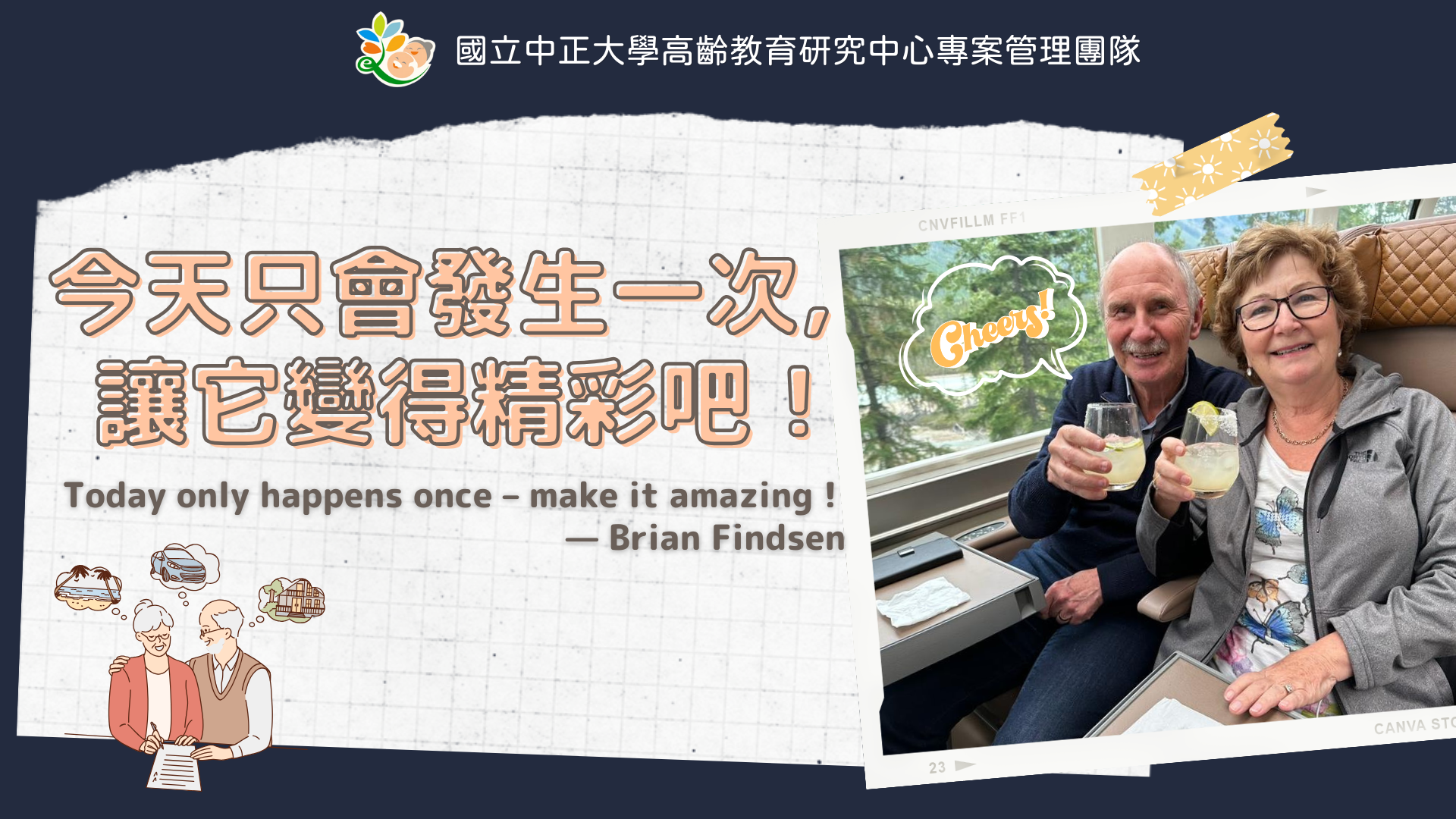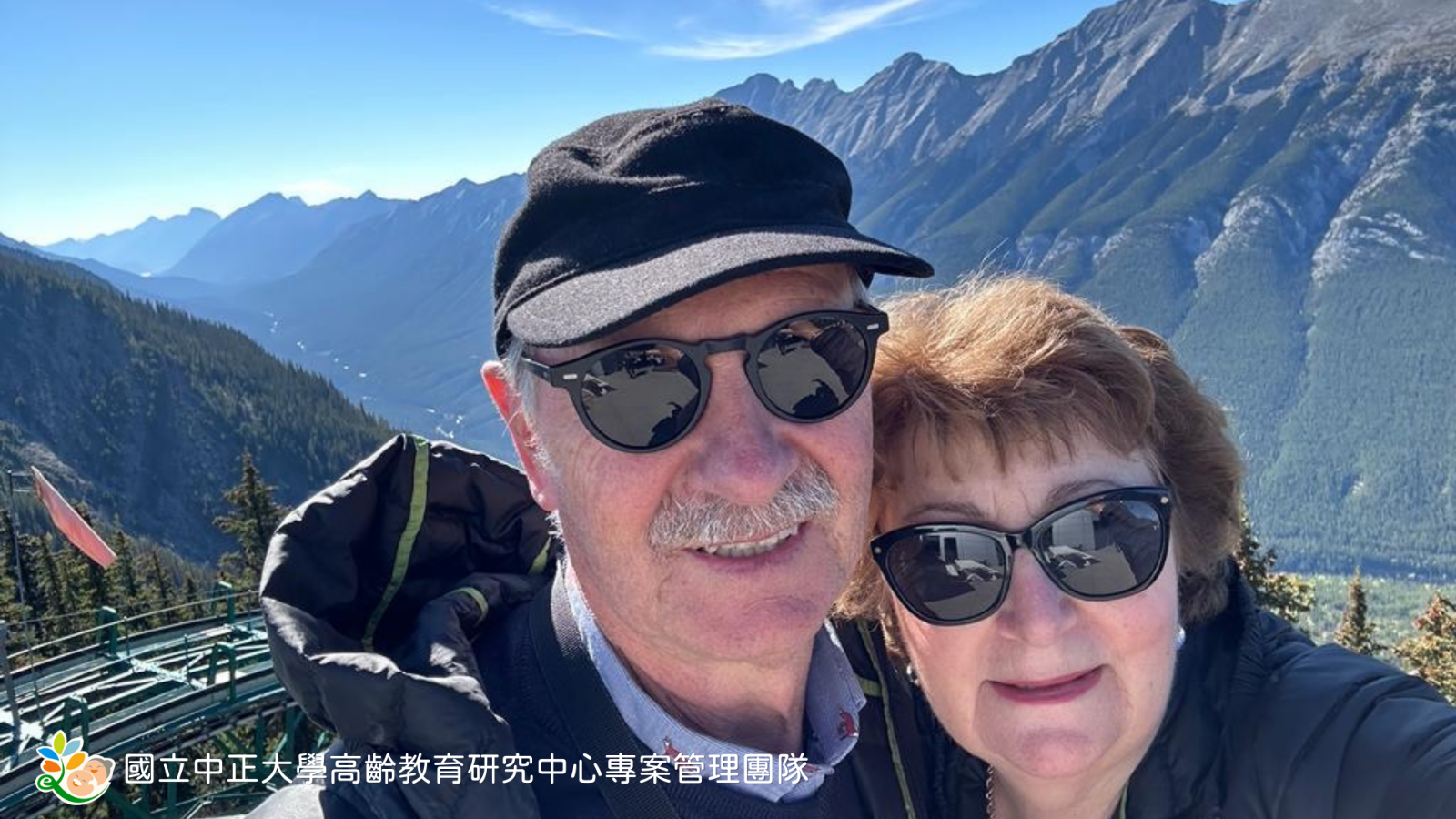今天只會發生一次,讓它變得精彩吧!— Brian Findsen

Reflecting on Retirement.
Brian Findsen, Emeritus Professor, New Zealand
Before retirement
I had returned from working in Glasgow as a Professor of (Adult) Education in 2008 and continued employment at the University of Waikato in Hamilton,
New Zealand, until eventual formal retirement in July 2019. While Caterina, my wife, and I were conscious of pending retirement during that period (2008-2019), it is only well into my 60s that the prospect of retirement took serious hold in my mind. New Zealand does not have compulsory retirement though at
the age of 65, most older people are eligible to receive a universal pension (not means tested). Hence, 65 is a serious trigger for most seniors to think of the
latter part of their lives and what they may do. This was the case for me though Caterina and I had made some earlier preparations in our 50s.
In partial preparation for actual retirement from the University, I negotiated a reduction in working hours (and payment!) from 1.0 to 0.5 of a position. I did
not want to suddenly retire, working one day and not the next. In retrospect this was a good decision as it enabled me to get accustomed to retirement and
what it might really mean in practice.
The suddenness from leaving the University of Waikato was mainly mitigated by the invitation to join the National Chung Cheng University (NCCU) in Chiayi
later in 2019 as a visiting scholar before covid 19 broke out in January 2020. This time with the Department of Adult & Continuing Education at NCCU was a welcome transition to a less certain future than in my past. I could build on and contribute some expertise in my principal research area, learning in later life, in a different cultural context.
Making a list of possibilities
Just prior to actual retirement from the University (I do not consider I have entirely retired from academic life), I made a list of activities I thought I might
continue or begin. In no particular order, here is that list (compiled in early 2019):
- Writing and editing - continuing academic work
- Volunteering – at a local level or overseas
- Project work – related to established interests
- Tourism/travel – in New Zealand and overseas
- More family time
- Property development – home and garden
- Keeping fit – regular exercise
- Sustaining links to internal organizations – PIMA; PASCAL; ACAP
- Consultancy – especially in preparing and living in retirement
- Maori (indigenous) language – extending my acquired expertise
- Engaging in great walk and riding (bicycle) tracks

Actual Retirement
At the time of constructing this article, November 2023, it is over four years since I formally retired. From the above eleven possibilities, most have been
activated, not necessarily in a fully conscious way but because opportunities have been presented to me. I have come to accept that this is what “retirement” means to me – building on past strengths but also maintaining an active ageing profile undertaking a variety of tasks. Yet, balance in my life is crucial – fulfilling family obligations; keeping good relationships going (both local and international); maintaining good health through regular exercise at a gym; creating space to just enjoy every day. In our kitchen there is a sign that reads “Today only happens once – make it amazing”. Appreciation of what I/we have and the choices open to us are really important. Maintaining balance in the range of tasks performed in both the short and long term is also crucial.
In deciding what retirement might mean, it is necessary to acknowledge how context usually determines what is realistic. By context, I mean the personal
circumstances of our daily lives, the wider country characteristics (history; culture; economics) and the state of the global scene (peace/conflict; politics).
Each has its own effects.
Obviously, finance is very important to secure well before the moment of retirement arrives. In our case, a combination of sources, primarily through work superannuation and family inheritance, has helped us to weather storms and to travel. Both Caterina and I continue some paid work but most of my time is allocated to a voluntary task as Chair of the Age Friendly Hamilton Steering Group. Our job as a collective of volunteers under the rubric of the Hamilton City Council is to provide support to individuals and agencies working with older people to uphold their well-being. Employment is important to me as it helps occasionally with finances but just as significantly with keeping social relationships going and providing structure to my life, whether daily, weekly or yearly. Similarly, keeping fit is not just a matter of doing sensible exercises. I chose a gym as a venue because it requires me to get in my car and I get to know people of all ages and cultures, thus expanding my horizons. It also helps because a café is located within the gym site and I am fond of my morning cappuccino.
One of the joys of retirement is having more time to spend with family, especially our four grandchildren. Each of our two children have two children, ages range 7 to 14, so we consider our close family to consist of 10 individuals. I am the patriarch now at 72. We offer our services as childminders for the four grandchildren, three girls and one boy, but it is a negotiated process so we retain autonomy in our lives. A further addition to our home, just two humans, is Leo, our cavoodle dog, who is now approaching three years on this earth. He is an amazing boon to our lives as he is like a cuddly teddy bear. I never expected to feel so much love for an animal. Amanda, our daughter, who lives close by, has Leo’s sister so quite often we have two lovely dogs to enrich our lives.

As I paint this picture of retirement, I am acutely aware of our immense privilege. I am conscious of increasing poverty in this and other countries and the plight of seniors who have difficulty meeting their daily needs, including food and suitable housing. Some retirees in New Zealand live on a Government pension only and their lives are very constrained. I look forward to a time when more older adults can have the freedom of choice and comfortable lifestyle I have in my retirement to this point.
Dr Brian Findsen
18 November 2023
Hamilton, New Zealand